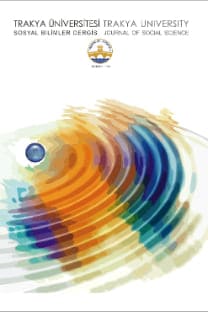The alliance of international communication and international politics in the age of globalization
Siyasetin, ekonominin ve kültürün küreselleşmesi, küresel bir iletişim ağının varlığını da zorunlu kılar. Küresel bir iletişim ağının, kürenin her noktasını birbirinden haberdar ettiği varsayımı yapılsa da, küresel medya, sık sık, olumsuz bir çağrışımla anılan küreselleşmenin tamamlayıcısı olarak görülür. Küresel medyanın siyasi ve ekonomik olarak güçlü durumda olanların elinde bulunduğu ve dolayısıyla siyasi, ekonomik ve kültürel bir üstünlük kurmanın ve bunu sürdürmenin başlıca araçlarından biri olduğu da, uluslararası politikaya ve küresel iletişim ağlarına yöneltilen eleştirilerden biridir.Bu metinde, uluslararası iletişimin tarihsel gelişimine değinilerek, bugün, adına küresel denilen medyanın nasıl oluştuğu üzerinde durulacaktır. Uluslararası iletişim teorilerine ve bu teorilerin içeriklerinin ve ortaya çıkış biçimlerinin uluslararası politikayla bağlantılarına yer verilecek; küresel düzeyde kitle iletişiminin, uluslararası politikadaki güç mücadeleleriyle ve siyasi ve ekonomik gücü elinde bulunduranların öngördüğü toplum modelleriyle yakından bağlantılı olduğu fikri işlenecektir.
küreselleşme çağında uluslararası iletişim ile uluslararası politikanın işbirliği
Globalization of politics, economics and culture requires a global communication network. Although it is assumed that global communication network connects various parts of the globe, global media are often criticized as collateral of globalization. Another criticism points out the widespread assessment that global media serve to the interests of the powerful in international politics and therefore having control of global communication network means having a political, economic and cultural mastery. Mentioning the historical background of international communication, the paper is going to review how international media have been evolved to today’s global media. Reviewing international communication theories and their relations with international politics, it is going to be argued that media in the global scale have been closely connected with the struggle for power in international relations and the societal models the powerfuls’ interests necessitate.
___
- Adorno, Theodor W, The Culture Industry, London, Routledge, 1991.
- Bell, Daniel, The Coming of Post-Industrial Society: A Venture in Social Forecasting, New York, Basic Books, 1973.
- Boyd-Barrett, Oliver, “Media Imperialism: Towards an International Framework for the Analysis of Media Systems”, in Curran, J., Gurevitch, M. and Woollcott, J. (eds.), Mass Communication and Society, London, Edward Arnold, 1977, p. 116-135.
- Castells, Manuel, The Information Age Volume 1: The Rise of the Network Society, Oxford, Malden, Blackwell Publishers, 1996.
- Castells, Manuel, The Internet Galaxy: Reflections on the Internet, Business, and Society, Oxford, Oxford University Press, 2001.
- Dawson and John Bellamy Foster, “Virtual Capitalism, in McChesney”, R. W., Wood E. M., Foster, J. B. (eds.), Capitalism and the Information Age: The Political Economy of the Global Communication Revolution, New York, Monthly Review Press, 1998, p. 51- 67.
- Frank, Andre Gunder, Latin America: Underdevelopment or Revolution, New York & London, Monthly Review Press, 1969.
- Galtung, Johan, “A Structural Theory of Imperialism”, Journal of Peace Research, Vol. 8. No.2., 1971, p. 81-117.
- Gershon, Richard, “The Transnational Media Corporation and the Economics of Global Competition”, in Artz, L. and Kamalipour, Y. (eds.), The Globalization of Corporate Media Hegemony, New York, State University of New York Press, 2003, p. 51- 72.
- Giddens, Anthony, The Consequences of Modernity, Stanford (Cal), Stanford University Press, Oxford, Basill Blackwell, Cambridge, Polity Press, 1991.
- Habermas, Jürgen, The Structural Transformation of the Public Sphere: An Inquiry into a Category of Bourgeois Society, Cambridge Massachusetts, The MIT Press, 1989.
- Hale, Julian, Radio Power: Propaganda and International Broadcasting, Philadelphia, Temple University Press, 1975.
- Herman and Robert McChesney, The Global Media, London, Cassell,1997.
- Horkheimer and Theodor W. Adorno, Dialectic of Enlightenment, New York, Herder and Herder, 1972.
- Horten, Gerd, Radio Goes to War: The Cultural Politics of Propaganda during World War II, Berkeley and Los Angeles, University of California Press, 2002.
- Lerner, Daniel, The Passing of Traditional Society: Modernizing Middle East, New York, Free Press, 1958.
- Mattelard and Armand Mattelard, Theories of Communication: A Short Introduction, London, Sage, 1998.
- McChesney, Robert, “The Political Economy of Communication and the Future of the Field”, in Media, Culture & Society, Vol. 22, No. 1, 2000, p. 109–116.
- McLuhan, Marshall, Understanding Media, London, Methuen, 1964.
- Pike and Dwayne Winseck, “The Politics of Global Media Reform 1907- 23”, in Media, Culture & Society, Vol. 26, No. 5, 2004, p. 643-675.
- Rampal, Kuldip R., “Global News and Information Flow”, in Y.R. Kamalipour (Ed.), Global Communication, Belmont, CA, Wadsworth, 2000, p. 97- 117.
- Roach, Colleen, “The Western World and the NWICO: United They Stand?”, in Peter Golding and Phil Harris (eds.), Beyond Cultural Imperialism, London, Sage, 1997, p. 94- 116.
- Sawhney, Harmeet, “Global Economy and International Telecommunications Networks”, in Y. R. Kamalipour (Ed.), Global Communication, Belmont, CA, Wadsworth, 2000, p. 35-49.
- Schiller, Herbert, The Mind Managers, Boston, Beacon Press, 1973.
- Schiller, Herbert, Information Inequality: The Deepening Social Crisis in America, New York, Routledge, 1996.
- Schramm, Wilbur, Mass Media and National Development: The Role of Information in the Developing Countries. Stanford, CA, Stanford University Press, 1964.
- Thussu, Daya K., International Communication: Continuity and Change, London, Arnold, 2000.
- Toffler, Alvin, The Third Wave, London, Collins, 1980.
- Varis, Tapio, “Peace and Communication: An Approach by Flow Studies”, in Journal of Peace Research, Vol. 19, No.3, 1982, p. 241-250.
- Vivian, John, The Media of Mass Communication. Boston, Allyn & Bacon, 1999.
- ISSN: 1305-7766
- Yayın Aralığı: Yılda 2 Sayı
- Başlangıç: 2000
- Yayıncı: Trakya Üniversitesi Sosyal Bilimler Enstitüsü
Sayıdaki Diğer Makaleler
TURİZM İŞLETMELERİNDE LİDERLİK TARZLARI VE LİDER-ÜYE ETKİLEŞİMİ KALİTESİ (LÜE) ÜZERİNE BİR ÇALIŞMA
SANCAK ( HATAY ) sorunu ve ikinci dünya savaşı öncesi süreçte Arap kamuoyundaki etkileri
Leonardo Da Vinci'de sanat,bilim ve etkileşimi
The alliance of international communication and international politics in the age of globalization
YÖNETİCİ GÖREV VE ÇALIŞMA SÜRELERİNİN YÖNETSEL ETKİNLİĞE KATKISI: OTEL İŞLETMELERİNDE BİR ARAŞTIRMA
SPRACHUNSICHERHEITSGRÜNDE TÜRKISCHER DEUTSCHSTUDIERENDEN IM GEBRAUCH DER PRÄPOSITIONEN IM DEUTSCHEN
KÜRESELLEŞME ÇAĞINDA ULUSLARARASI İLETİŞİM İLE ULUSLARARASI POLİTİKANIN İŞBİRLİĞİ
Otel işletmelerinde yöneticilerin dışsal krizlere yaklaşımlarına yönelik bir araştırma
